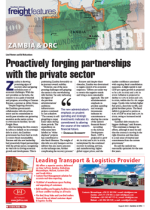Zambia is facing a critical juncture as it grapples with the evolving dynamics of its mining sector. With many of its mines entering deeper terrains, the nation is confronting declining rates of return. To secure a prosperous future for its mining industry, Zambia has set its sights on a bold target: producing three million tons of copper by 2030. However, this ambitious goal was fraught with challenges that demanded innovative strategies and sustained efforts, said Duncan Bonnett, a partner at Africa House.Speaking to Freight News, Bonnett said much like South Africa's gold mines, older copper mines were being pushed to delve deeper underground to extract the remaining resources. "This trend has led to diminishing returns, as extracting copper from greater depths becomes more complex and expensive."This has led to an urgency to chart a new course for the copper industry, underscoring that the nation's current copper production is dwindling due to the declining output from these older mines. According to Bonnett, Zambia's key priority over the next decade is to facilitate the development of new mines and the expansion of existing operations."There is quite a lot of activity on the ground in Zambia," said Bonnett. "Several greenfield projects, as well as the expansion of existing operations, are in the pipeline. This is necessary if Zambia is to turn the tide and make the target it has set for itself."Describing the country's goal to reach three million tons of copper production by 2030 as ambitious, Bonnett said there were also projects being explored around nickel and uranium. "The Zambian government seems to be getting quite a good response from the mining sector, indicating interest. This has been helped by the government's decision to relook at some of the decisions made by the previous president around the mining sector and taxes."According to Bonnett, the decision to strip back some of the punitive taxes imposed by former President Edgar Lungu and the move to bring the mining fraternity back into the fold have been well-received. "This has led to some interesting developments in the mining sector, with the larger mining companies investing and expanding in operations again."He said it was a critical move as Zambia was increasingly looking less attractive than its neighbours, particularly the Democratic Republic of the Congo (DRC). "Regarding taxes and its regulatory environment, it was completely out of kilter with the DRC. President Hichilema understood that he needed to make some necessary changes. The country is definitely on the right track at present."

